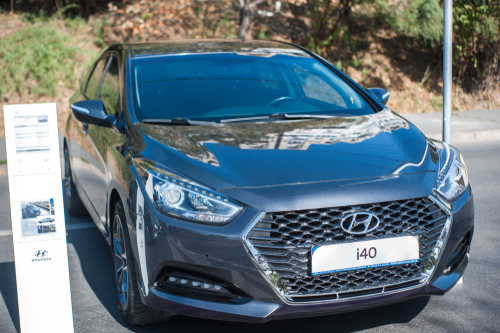
The TPMS light indicates that your Hyundai i40’s tire pressure is above or below the minimum threshold set by the manufacturer.
The tire pressure monitoring system (TPMS) light is the most common warning light on a modern vehicle.
If you have a TPMS warning light, your car’s tire pressure must be checked.
If your Hyundai i40 has a tire pressure warning light, it can only be caused by a few things. Once you very that your car has the proper tire pressure, the TPMS is not a safety concern or breakdown risk.
The most common reasons the TPMS light won’t go out are over or under-inflated tires or a tire pressure sensor-related issue.
How Tire Pressure Monitoring Systems Work
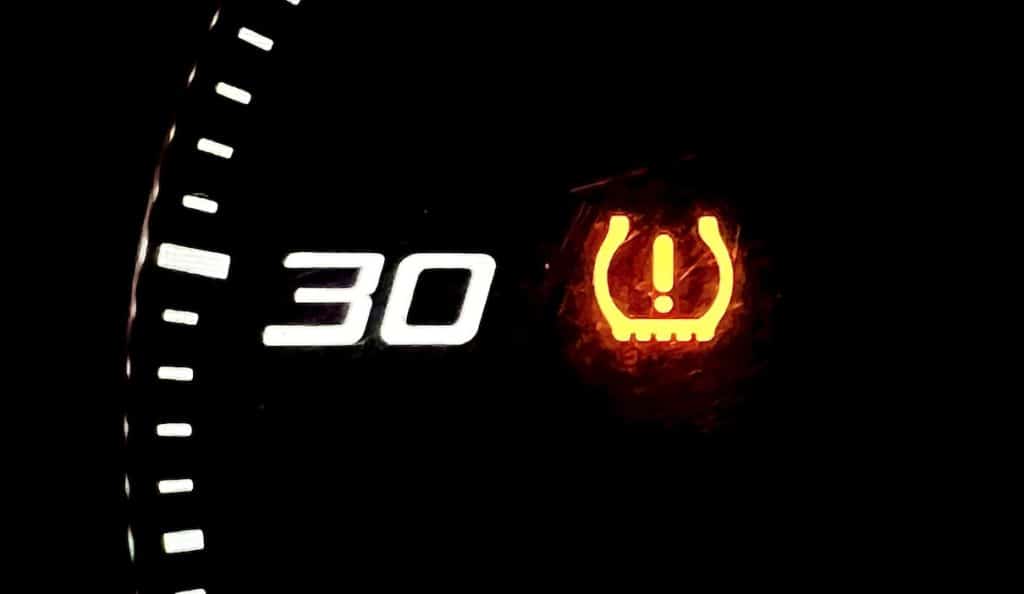
There are two main types of tire pressure monitoring technology. Your Hyundai i40 almost certainly has the “direct” version.
Direct Monitoring
Direct tire pressure monitoring systems come on virtually all new vehicles.
- Tire Pressure Sensors- They monitor the tire pressure in each wheel directly. They are battery-powered, transmit data wirelessly, and usually last about ten years.
- Receiver– The sensors are wireless and transmit data to a receiver; if the data from any of these sensors indicate that your i40’s tire pressure is too low (usually 25% under the recommended pressure), the TPMS light will come on.
- TPMS Light– Indicates that one of the tire pressure sensors has detected an improperly inflated tire or there is an issue with the TPMS system.
Indirect (a very uncommon setup)
Indirect tire pressure monitoring takes data from the wheel speed sensors. It uses this data to report if the tire pressure is low. If a tire gets too low, it’ll turn minutely faster than a full tire. The wheel speed sensors pick up on this and report it to the PCM. It’s unlikely your Hyundai i40 has this system.
Hyundai i40 TPMS Light: How to Turn Off
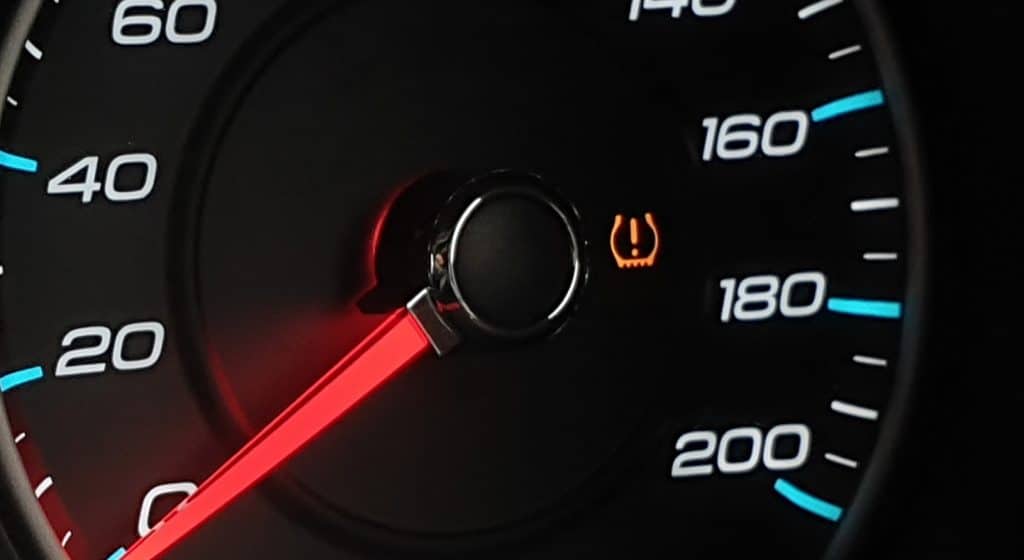
Check and fill all the tires. Once you know the tire pressure checks out, the TPMS light stops becoming a safety concern, even if it doesn’t turn off.
99% of the time, getting the tire pressure back to the recommended pressure will turn off your i40’s TPMS light.
You should check all of your i40’s tires simultaneously to avoid going through this process again in a few weeks (tires without leaks lose pressure at about the same rate).
Check the Tire Pressure
Check the tire pressure on all four of your car’s wheels with a tire pressure gauge. Verify that they match the Hyundai’s recommended psi (there’s a sticker that’ll tell you inside the driver’s door). Overinflated tires can be just as dangerous as underinflated tires.
Add Air
Use the sticker on the inside of your i40’s door. It has the manufacturer’s recommended tire PSI and size.
If the tires are underinflated, add air. If the tires are overinflated, let some air out. Most gas stations have an air compressor that you can use to add air. Some service stations will let you program the air pressure, while others only have an air hose.
If you need help filling a tire, there’s a section on inflating tires at the end of this article.
What if adding air didn’t help?
If your i40’s TPMS warning light stays on after you’ve verified that the tire pressure is correct, jump down to the next section.
Hyundai i40: TPMS Light Staying On Causes
1. You Haven’t Driven Since Airing Your Tires
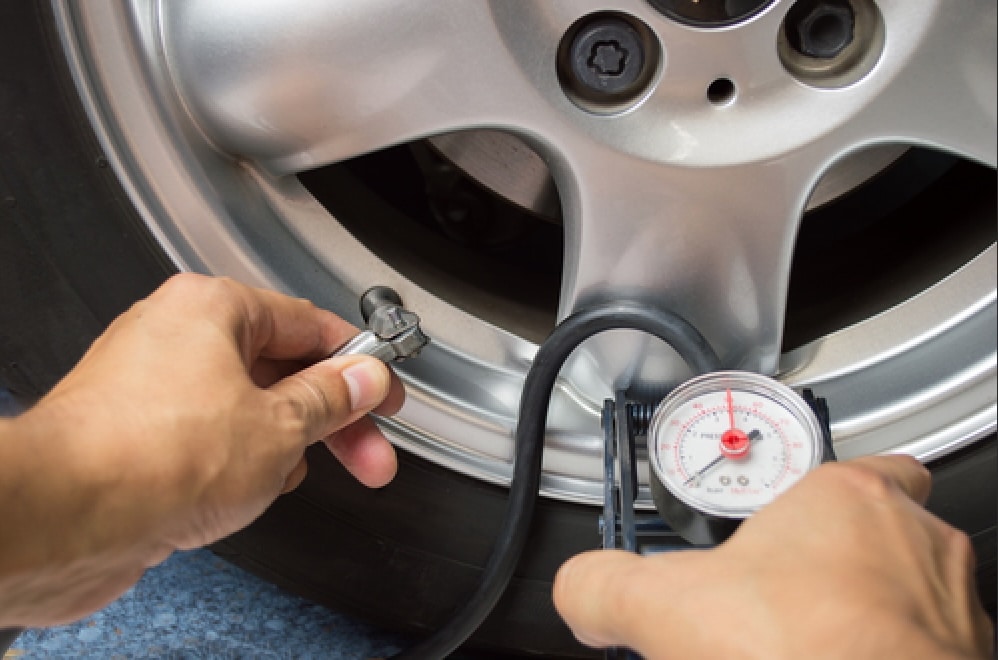
Your Hyundai i40’s tire monitoring systems want the car to move a bit before verifying the tire pressure is back within spec.
If you are reading this and haven’t moved your car around, try driving it and see if the tire TPMS light turns off.
2. Incorrect Tire Pressure
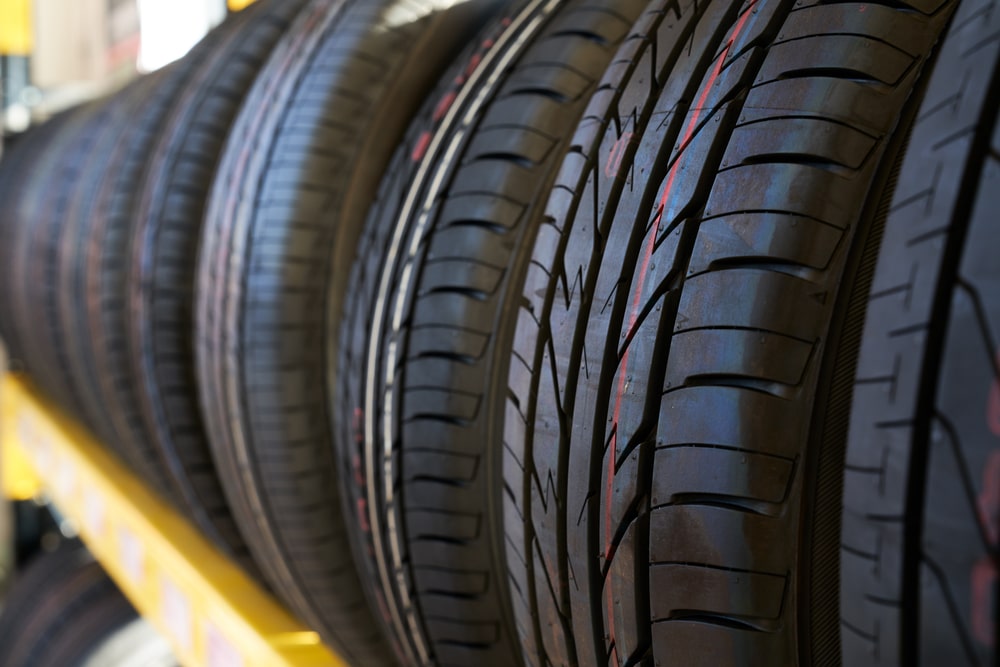
The tire pressure is below the required level: If one or more of your i40’s tires has a pressure lower than recommended, your TPMS light will come on and stay lit until the pressure returns to the appropriate level.
If you’ve recently added pressure to your vehicle’s tires, it could be that you put TOO MUCH air in, which will keep the TPMS light on.
3. Faulty TPMS Sensor
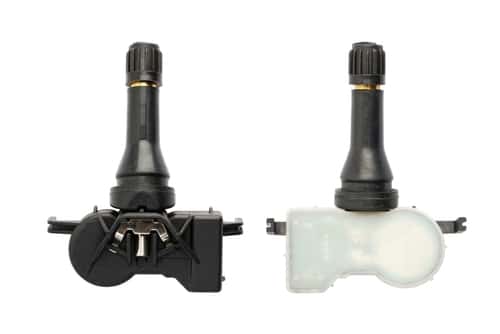
The TPMS is likely reporting that the tire pressure is still too low. A faulty TPMS sensor can cause your light to come on. The defective sensor may need to be replaced or reset.
Your i40 may have a “service tire pressure monitoring system” warning or a flashing TPMS light.
4. Low Battery in the TPMS Sensor
If the battery of your car’s TPMS sensor is low, it can cause the light to come on. You may need to replace the battery for the light to turn off.
5. Damaged TPMS Valve Stem
The valve stem that transmits information from your tire to the TPMS receiver can become damaged or clogged, causing the light to come on. You may need to replace or clean this valve.
6. Issues After Rotating the Wheels
If you have recently rotated your i40’s wheels, the TPMS system may need to reset.
Common Questions
Can you drive with the TPMS light on?
If your tire pressure light is on even after manually checking your i40’s tire pressure, it is entirely safe to drive with the TPMS light on. Just keep an eye on the tire pressure from time to time.
Driving with low tire pressure is not advisable. When your vehicle’s tire pressure is too low, it can cause damage to the sidewall, which can damage the integrity of the tire even after you inflate it.
Overinflation causes a tire to lose its ability to take impact from a bump. It also decreases the contact surface with the road and will show this by wearing more in the center (where it’s making contact with the road).
How do you check tire pressure?
Your i40 may give you tire pressure data. But, even if it does, it’s better to verify all four wheels with a tire pressure gauge manually.
- Unscrew the valve stem cap.
- Push the tire pressure gauge down onto the valve stem.
- Observe the tire pressure/
What should your vehicle’s tire pressure be?
A sticker inside your i40’s driver door jamb should tell you the exact pressure for the front and rear wheels.
How long do TPMS sensors last?
The life expectancy of a TPMS sensor typically ranges from 5-10 years, depending on the type of sensor and the environment it is exposed to.
If one of the tire pressure sensors becomes damaged or its battery runs out of power before its expected lifespan, it can cause the TPMS light to come on in your car’s dashboard.
Why is my TPMS light blinking?
The tire pressure light blinks to warn you that there is an issue with the tire pressure sensor (either defective or has a low battery) or the receiver is malfunctioning.
Conclusion
Most of the time, the TPMS will go off if you add air to your Hyundai i40’s tires. If it doesn’t go off, there is likely an issue with one of the wheel pressure sensors.

